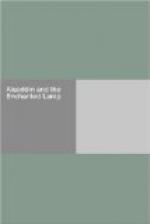[FN#180] Istehhweda (vulg. for istehhwedha) aleyya. Burton, “of the pains which prevailed upon me.”
[FN#181] Or “succeedeth” (yekklufu). Burton, “the legacy bequeathed to us by.”
[FN#182] Khellefa.
[FN#183] Night DXIX.
[FN#184] Lit. “abide in the subsistence of the like of this one " (acoumu fi ma"sh mithl hadha). Burton, “go about for a maintenance after this fashion.”
[FN#185] Uhheszszilu ana ma"ski ana buddi men yuayyishani. Burton, “I am compelled to provide him with daily bread when I require to be provided.”
[FN#186] Ibn nas generally signifies “a man of good family” (Fr. fils de famille), but here the sense seems to be as in the text.
[FN#187] Or “constrain not thyself for me,” in do not be ashamed to say what thou wishes”, lit. “let it not be hard or grievous upon thee from or on account of me” (la yesubu aleika minni). Burton, “Let not my words seem hard and harsh to thee.”
[FN#188] Fe-in kana keman (vulg. for kema anna). Burton, “if despite all I say.”
[FN#189] Fi, lit. “in,” but here used, as is common in Syria, instead of bi “with.”
[FN#190] Burton, “Shalt become famous among the folk.”
[FN#191] Khwaja (Persian).
[FN#192] Tajir (Arabic equivalent of khwaja).
[FN#193] Burton, “that such folk dress handsomely and fare delicately.”
[FN#194] Night DXX.
[FN#195] Lit. “was past” (fata). Burton, “the dark hours were passing by and the wine was drunken.”
[FN#196] Sherab. Burton, “sherbets.”
[FN#197] Night DXXI.
[FN#198] Or “places” (amakin).
[FN#199] Or “streets” (mehellat). Burton, “apartments.”
[FN#200] i.e. “It is no merit in me that I do what I have done.”
[FN#201] Bi-jahi ’l awwelin. Burton, “by the honour of the Hallows.”
[FN#202] i.e.. “a protection.”
[FN#203] Lit. “that thine eye will be cooled with (or by) him.”
[FN#204] Likai yetearrefa fihim wa yetearrefou fihi. This passage confirms my reading of a former one; see ante, p. 68, note 3. {see FN#189}
[FN#205] Nighs DXXII.
[FN#206] Lit. “believed not what time (ayyumetn) the day broke;” but ayyumeta (of which ayyumeta is a vulgar corruption) supposes the future and should be used with the aorist. The phrase, as I have translated common in the Nights.
[FN#207] Or, “laughing at” (yudsahiku).. Burton, “he began to make the lad laugh.”
[FN#208] Szeraya (for seraya).
[FN#209] Keszr.
[FN#210] Newafir, an evident mistranscription, probably for some such word as fewawir, irregular form of fewwarat, pl. of fewwareh, a spring or jet of water.
[FN#211] Burton adds, “and reach the end of our walk.”
[FN#212] Jebel aali. Burton, “the base of a high and naked hill.”




